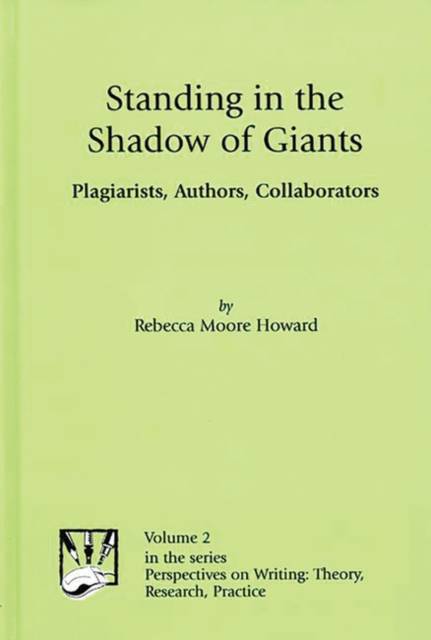
Bedankt voor het vertrouwen het afgelopen jaar! Om jou te bedanken bieden we GRATIS verzending (in België) aan op alles gedurende de hele maand januari.
- Afhalen na 1 uur in een winkel met voorraad
- Gratis thuislevering in België vanaf € 30
- Ruim aanbod met 7 miljoen producten
Bedankt voor het vertrouwen het afgelopen jaar! Om jou te bedanken bieden we GRATIS verzending (in België) aan op alles gedurende de hele maand januari.
- Afhalen na 1 uur in een winkel met voorraad
- Gratis thuislevering in België vanaf € 30
- Ruim aanbod met 7 miljoen producten
Zoeken
€ 161,45
+ 322 punten
Uitvoering
Omschrijving
Who's cheating whom in college writing instruction? This book argues that through binary privileging of the real author (the inspired, autonomous genius) over the transgressive writer (the collaborator or the plagiarist), composition pedagogy deprives students of important opportunities to join in scholarly discourse and assume authorial roles. From Plato's paradoxical dependence on and rejection of Homer, to Jerome McGann's dismissal of copyright as the hand of the dead, Standing in the Shadow of Giants surveys changes and conflicts in Western theories of authorship. From this survey emerges an account of how and why plagiarism became important to academic culture; how and why current pedagogical representations of plagiarism contradict contemporary theory of authorship; why the natural, necessary textual strategy of patchwriting is mis-classified as academic dishonesty; and how teachers might craft pedagogy that authorizes student writing instead of criminalizing it.
Specificaties
Betrokkenen
- Auteur(s):
- Uitgeverij:
Inhoud
- Aantal bladzijden:
- 212
- Taal:
- Engels
- Reeks:
Eigenschappen
- Productcode (EAN):
- 9781567504361
- Verschijningsdatum:
- 18/05/1999
- Uitvoering:
- Hardcover
- Formaat:
- Genaaid
- Afmetingen:
- 158 mm x 236 mm
- Gewicht:
- 462 g

Alleen bij Standaard Boekhandel
+ 322 punten op je klantenkaart van Standaard Boekhandel
Beoordelingen
We publiceren alleen reviews die voldoen aan de voorwaarden voor reviews. Bekijk onze voorwaarden voor reviews.









